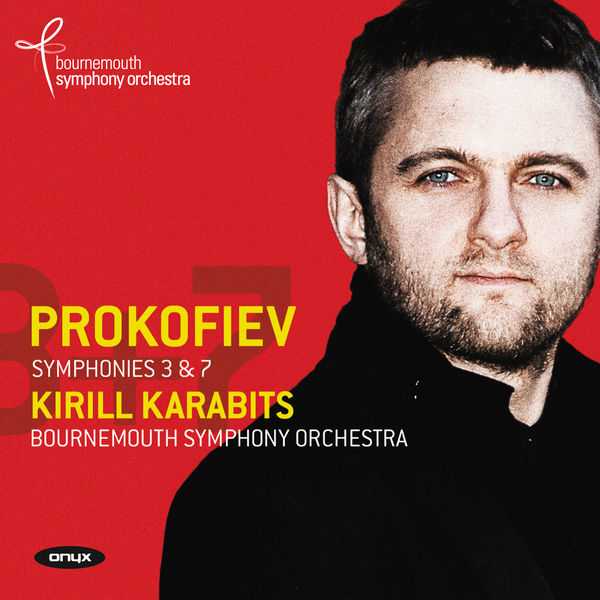
Composer: Sergei Prokofiev
Orchestra: Bournemouth Symphony Orchestra
Conductor: Kirill Karabits
Format: FLAC (tracks)
Label: Onyx
Catalogue: ONYX4137
Release: 2014
Size: 286 MB
Recovery: +3%
Scan: cover
Symphony No. 3 in C minor, Op. 44
01ю I. Moderato
02. II. Andante
03. III. Allegro agitato — Allegretto
04. IV. Andante mosso — Allegro moderato
Symphony No. 7 in C sharp minor, Op. 131
05. I. Moderato
06. II. Allegretto – Allegro
07. III. Andante espressivo
08. IV. Vivace — Moderato marcato
09. Vivace (alternative ending)
This is the first release in a survey of all seven Prokofiev Symphonies from Kirill Karabits and the Bournemouth Symphony Orchestra. Karabits has had access to the Prokofiev family archive and throughout this project there will be quite a few surprises, such as music from the early Symphony in G of 1902 and works such as ‘Dreams’ Op. 6, ‘Autumnal Sketch’ Op. 8 and ‘Two Poems for orchestra and Women’s Chorus’ Op. 7, as well as the ‘Sinfonia Concertante’ for cello & orchestra. Each CD booklet contains an interview with Karabits in conversation with Prokofiev expert Daniel Jaffé.
The 3rd Symphony makes extensive use of music from the opera ‘The Fiery Angel’. It was premiered in 1929 under Pierre Monteux and is vividly colourful, sensual and exciting. The 7th dates from 1952, the year before the composer’s death. Intended as a work for young people, it is beautiful, yet enigmatic and reflective, harking back to the great ballet scores. Prokofiev provided an alternative ‘upbeat’ conventional ending to the symphony at the request of colleagues so as not to provoke criticism from the Soviet authorities. This alternative finale can be heard after the 7th symphony on this CD. Today the work is always performed with the peaceful ‘leave taking’ ending that the composer preferred.
The seven symphonies of Sergey Prokofiev vary in popularity, and only the Symphony No. 1, “Classical” and the Symphony No. 5 are uncontested favorites. Somewhat less loved are the Symphony No. 3 in C minor (based on themes from the opera The Fiery Angel), and the Symphony No. 7 in C sharp minor, the last and possibly least understood of the cycle. These works seem as though they should be embraced by audiences because of their accessible tonality, memorable themes, and vibrantly colored sonorities, yet there has been some resistance to the Third’s acidic dissonances and the Seventh’s quizzical tone, aspects that are supposedly harder for listeners to appreciate. However, both works reward close study, and these live recordings by Kirill Karabits and the Bournemouth Symphony Orchestra are an excellent introduction to these under-performed classics. Karabits is recording the entire cycle for Onyx, and his choice of these symphonies for the first installment suggests that he encourages a reappraisal of Prokofiev’s music, especially of the Third’s attractive scoring and cinematic style, as well as the Seventh’s straightforward development and soaring melodies. This is certainly an intelligent way to open a Prokofiev set, and Karabits adds value by including a recording of the original ending of the Seventh. (The rest of the recordings will feature Prokofiev rarities that are connected to the origins of the symphonies.) This volume is a promising beginning, and it is highly recommended for the exciting performances and exceptional audio quality.